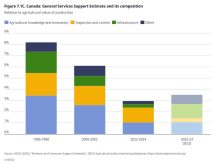With the speed of a slow-moving freight train, the federal government has finally picked a facilitator to find a way to fix the cantankerous relationship between shippers and railways.
Jim Dinning, a former Alberta finance minister and chairman of the Export Development Corp., will lead the six-month process to develop a model for service agreements and a streamlined dispute-resolution process, says Transport Minister Denis Lebel.
These commercial measures are key steps that the government has committed to in order to enhance the effectiveness, efficiency and reliability of the rail freight supply chain, he said.
Read Also

Ceres AI leans into John Deere integration
Ceres said by connecting systems with John Deere, it’s helping growers move from managing data to acting on it.
The appointment was welcomed by shipper groups, which have been pushing for this sort of action since 2006. The appointment was announced as Parliament debated legislation to strip the Canadian Wheat Board of its marketing monopoly, a move critics fear will give the railways excessive market power.
The Rail Freight Service Review report released last year recommended a facilitator to develop a service agreement model and dispute-resolution process. The minister said his department is preparing legislation to give shippers the right to service agreements with the railways and provide a process to establish such agreements when commercial negotiations fail.
Transport and Agriculture Canada will soon begin to analyze the grain supply chain systems to focus on issues that affect that sector and identify potential solutions, said Lebel. Transport is also planning to develop supply chain performance metrics.
Dinning will have his work cut out for him, said transportation consultant Tom Maville, noting past attempts to develop meaningful dispute-resolution models have failed.
Reaching balanced rewards and penalties for service excellence and service failures respectively for both parties will be, in my opinion, a most difficult and steep uphill battle, he said.
Maville said there have been improvements in rail service recently, and other industry players said they hoped that trend will continue.
It means we are getting closer to sustained improved performance of the entire rail supply chain, ensuring our product reaches Canadian farmers and coastal ports in a cost-effective and efficient manner, said Roger Larson, president of the Canadian Fertilizer Institute.
It s critical to come up with a fix for inadequate and unpredictable rail service, said Avrim Lazar, president and CEO of the Forest Products Association of Canada.
We are keen to get moving as soon as possible to redress the unfair railway market power.
Unpredictable service and excessive freight rates have slowed growth especially in rural Canada, threatened jobs, and hurt the country s reputation as a reliable source of goods, he added.
Coming from a province heavily reliant on exports, (Dinning) understands the need to have predictable shipping to get business done, added Richard Phillips, executive director of the Grain Growers of Canada.
Shippers are looking for real change, not promises, said David Nobbs, chairman of Pulse Canada.
Service agreements must be effective and hold parties accountable for their performance.














